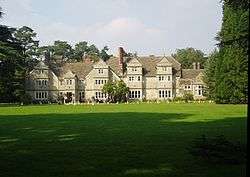Charles Goodwin (of Rowfant)
Charles Goodwin (of Rowfant) (1658–1731) was an English landowner who lived in the historic house of Rowfant in Sussex and served as High Sheriff of Sussex.

Charles Goodwin | |
|---|---|
| High Sheriff of Sussex | |
| Personal details | |
| Born | 1658 |
| Died | 1731 |
| Resting place | St Nicholas' Church, Worth |
| Nationality | British |
| Spouse(s) | Mary Mildmay |
| Residence | Rowfant House |
Life
Sir Robert Goodwin (1601–1681), MP for East Grinstead, had no surviving children, so his estate of Rowfant in the parish of Worth, Sussex passed to his brother John Goodwin (1605–1674). His eldest son was Deane Goodwin (1635–1660), who married Thomasine Oldfield and had two sons. The elder was Deane Goodwin (1658–1692), MP for Reigate, and the younger was Charles Goodwin, who inherited the estate on the death of his brother. In 1716 he served as High Sheriff of Sussex, the most senior official in the county.[1] He was buried in the church of St Nicholas at Worth on 14 June 1731[2] and his will of 19 November 1729 with a codicil of 26 November 1730 was proved in London on 5 July 1731.[3] His memorial in Worth church reads:
- Here lyes the body of Mary daughter of Henry Mildemay of Graces in the county of Essex Esq and late beloved wife of Charles Goodwin of Rowvant in this parish Esq She departed on the 17th day of Jan 1723 in the 65 year of her age … Here lyeth the body of Charles Goodwin Esq of this parish who died 9 June 1731 aged 74 years.[4]
In addition to his prime estate of Rowfant, he also inherited from his brother lands in Somerset at Wanstrow and Muchelney, in the latter parish the so-called manors of Neales, Barramores and Knowles. All went after his death to his nephew John and John's daughters.[5]
Family
After obtaining a licence on 11 December 1691,[6] on 17 December 1691 in the church of Saint Martin-in-the-Fields in Westminster, he married Mary (1660–1724), daughter of Sir Henry Mildmay of Graces, MP for Essex and his second wife Mary.[7] As they did not have any children, he made his nephew John Phillips (1687–1736 ), the son of his sister Catherine Goodwin and her husband Walter Phillips, his heir. John, who changed his name to Goodwin, in 1726 married Mary (1703–1774), the daughter of Thomas Watson and his wife Mary Sturgin.[8]
John and Mary had two daughters, Catherine Goodwin (1729–1742) and Mary Goodwin (1731–1762), who became the heiresses of Rowfant and the Somerset properties on his death in 1736 but did not marry. In 1739 their widowed mother took a second husband, the Reverend Andrew Bethune (1705–1767),[9] and with him had two more daughters, Anna Bethune (1740–1794) and Catherine Bethune (1745–1808), who became the heiresses in turn. Anna never married but in 1771 Catherine married her first cousin, the Reverend George Bethune (1746–1803), rector of Worth, and their eldest son, the Reverend George Maximilian Bethune (1772–1840), inherited the estates. Rowfant remained in the family until 1849, when it was sold to Sir Curtis Miranda Lampson, 1st Baronet.
References
- The London Gazette, No 5427, 21 April 1716 " An humble Address of the High-Sheriff, Justices of the Peace, Grand Jury, Clergy, and Freeholders of the County of Sussex, at the Assizes holden at East-Grinstead on 19 March 1715. Presented to His Majesty by Charles Goodwin, Esq, High-Sheriff, accompanied by several Gentlemen of the said County; introduced by the Right Honourable the Earl of Hartford, Lord-Lieutenant and Custos Rotulorum of that County. "https://www.thegazette.co.uk/London/issue/5427/page/1/data.pdf. Retrieved 30 October 2015
- England Deaths and Burials, 1538–1991. Salt Lake City, Utah: FamilySearch, https://familysearch.org/ retrieved 30 October 2015
- Prerogative Court of Canterbury and Related Probate Jurisdictions: Will Registers. Digitized images. Records of the Prerogative Court of Canterbury, Series PROB 11. The National Archives, Kew, England https://ancestry.co.uk/ (subscription required) retrieved 30 October 2015
- The Sessional Papers Printed By Order Of The House Of Lords Or Presented By Royal Command In The Session 1842, 5 & 6 Victoria, Arranged In Volumes, Vol XVI Evidence before Lords Committees for Privileges and before The House Reports from Select Committees of The House and Evidence, One Volume, The Subjects Alphabetically Arranged, Subjects of this Volume Fitzwalter, p49 https://books.google.co.uk/ retrieved 30 October 2015
- A P Baggs, R J E Bush and Margaret Tomlinson, 'Parishes: Muchelney', in A History of the County of Somerset: Volume 3, ed. R W Dunning (London, 1974), pp. 38–49 http://www.british-history.ac.uk/vch/som/vol3/pp38-49. Retrieved 28 October 2015
- London: Marriage Licences,1611–1828 https://ancestry.co.uk/ (subscription required) retrieved 30 October 2015
- The Visitations of Essex by Hawley 1552, Hervey 1558, Cooke 1570, Raven 1612, and Owen and Lilly 1634, to Which Are Added Miscellaneous Essex Pedigrees From Various Harleian Manuscripts and an Appendix Containing Berry's Essex Pedigrees, Volume 13–14, p707 http://www.mocavo.com/ retrieved 30 October 2015
- "England Marriages, 1538–1973" FamilySearch https://familysearch.org/ John Goodwin and Mary Watson, 10 November 1726, Saint Dunstan In The East, London, England FHL microfilm 396189, 942 B4HA V. 69, 942 B4HA V. 84–85, 942 B4HA V. 86–87. Retrieved 1 November 2015
- "England Marriages, 1538–1973" FamilySearch https://familysearch.org/ Andrew Bethune and Mary Goodwin, 8 December 1739, Saint Lawrence Jewry And Saint Mary Magdalene, London, England, FHL microfilm 374468, 942 B4HA V. 70, 942 B4HA V. 71, 942 B4HA V. 72. Retrieved 1 November 2015